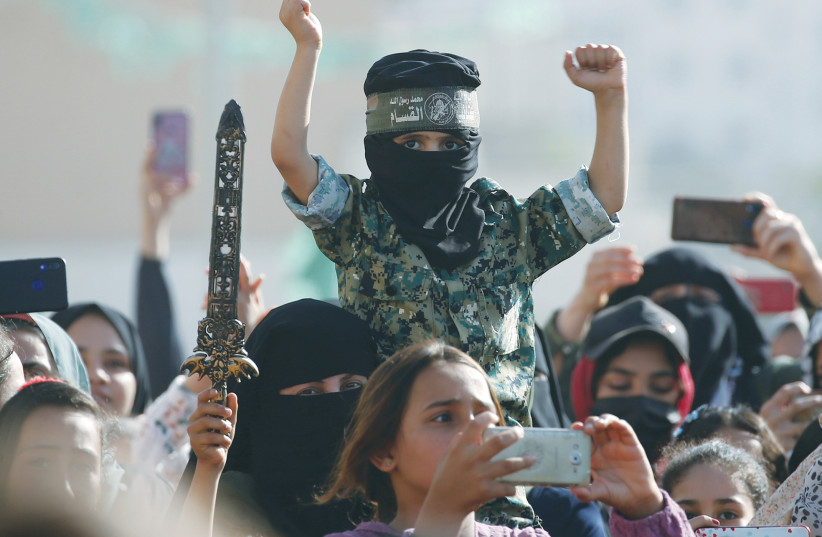A majority of the Palestinians think that Hamas is more deserving of representing and leading the Palestinian people, while a small percentage thinks Fatah is the one that deserves to do that.

(photo credit: MOHAMMED SALEM/REUTERS)
Support for Hamas has increased dramatically while support for Palestinian Authority President Mahmoud Abbas’s ruling Fatah faction dropped significantly, according to a public opinion poll published on Tuesday.
A majority of the Palestinians think that Hamas is more deserving of representing and leading the Palestinian people, while a small percentage thinks Fatah is the one that deserves to do that.
Conducted by the Ramallah-based Palestinian Center for Policy and Survey Research, the poll showed that 77 percent of Palestinians believe that Hamas has come out a winner in its last war with Israel.
Moreover, 65 percent think that Hamas has achieved its declared goal behind firing rockets at Israel: to stop the eviction of a number of Arab families from the east Jerusalem neighborhood of Sheikh Jarrah and to bring an end to Israeli “restrictions” on Muslim access to the al-Aqsa Mosque compound on the Temple Mount, the poll showed.
The poll, which covered 1200 Palestinians and has a margin error of three percent, was conducted between June 9 and 12.
The results showed that 72 percent of respondents think that Hamas’s decision to launch rockets at Israeli cities came in defense of Jerusalem and al-Aqsa Mosque. Only nine percent said they believed the attacks came in protest of the cancelation of the Palestinian general elections.
According to the poll, if new Palestinian presidential elections are held today, Hamas leader Ismail Haniyeh would get 59 percent of the votes, as opposed to 27 percent for Abbas.
If the competition was between jailed Fatah leader Marwan Barghouti and Haniyeh, Barghouti would receive 51 percent of the votes, while the Hamas leader would get 26 percent.
Hamas would also win in a parliamentary election, the poll found. More than 40 percent said they would cast their ballots for Hamas as opposed to 30 percent for Fatah.
Two-thirds of the Palestinian public believe that Abbas delayed the parliamentary and presidential elections because he was worried about the results, while 25 percent think he postponed them because Israel refused to allow the vote to take place in east Jerusalem. Sixty-five percent of respondents said they oppose Abbas’s decision, which was taken last April.
The poll also found that 58 percent of respondents oppose the two-state solution. A majority of 61 percent believes that the two-state solution is no longer practical or feasible due to the expansion of settlements in the West Bank. Moreover, 67 percent of respondents said that the chances for the establishment of a Palestinian state in the next five years are slim or nonexistent.
Nearly 40 percent of those surveyed said that they prefer the “armed struggle” against Israel; only 27 percent said that they prefer reaching a peace agreement with Israel. Under the current circumstances, a majority of 70 percent of Palestinians said they oppose the unconditional resumption of Israeli-Palestinian negotiations.
The poll found that 69 percent of the Palestinians are not optimistic about the new government in Israel led by Prime Minister Naftali Bennet.
As reported by The Jerusalem Post
